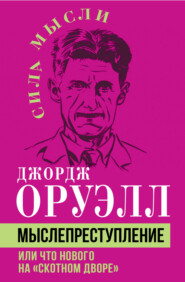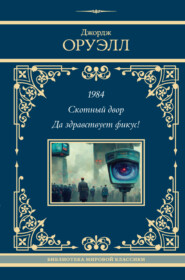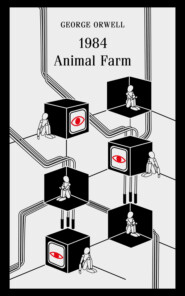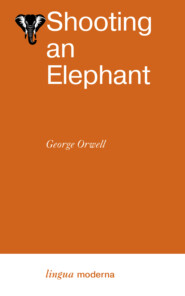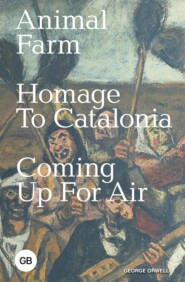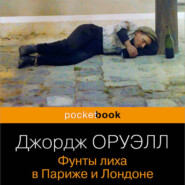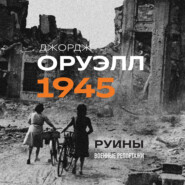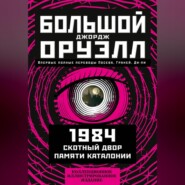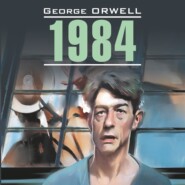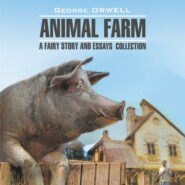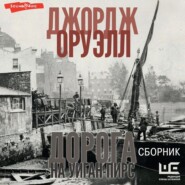По всем вопросам обращайтесь на: info@litportal.ru
(©) 2003-2025.
✖
1984
Настройки чтения
Размер шрифта
Высота строк
Поля
“Want to see the hanging! Want to see the hanging!” chanted the little girl, still capering round.
Some Eurasian prisoners, guilty of war crimes, were to be hanged in the Park that evening, Winston remembered. This happened about once a month, and was a popular spectacle. Children always clamoured to be taken to see it. He took his leave of Mrs. Parsons and made for the door. But he had not gone six steps down the passage when something hit the back of his neck an agonizingly painful blow. It was as though a red hot wire had been jabbed into him. He spun round just in time to see Mrs. Parsons dragging her son back into the doorway while the boy pocketed a catapult.
“Goldstein!” bellowed the boy as the door closed on him.
But what most struck Winston was the look of helpless fright on the woman’s greyish face.
Back in the flat he stepped quickly past the telescreen and sat down at the table again, still rubbing his neck. The music from the telescreen had stopped. Instead, a clipped military voice was reading out, with a sort of brutal relish, a description of the armaments of the new Floating Fortress which had just been anchored between lceland and the Faroe Islands.
With those children, he thought, that wretched woman must lead a life of terror. Another year, two years, and they would be watching her night and day for symptoms of unorthodoxy. Nearly all children nowadays were horrible. What was worst of all was that by means of such organizations as the Spies they were systematically turned into ungovernable little savages, and yet this produced in them no tendency whatever to rebel against the discipline of the Party. On the contrary, they adored the Party and everything connected with it. The songs, the processions, the banners, the hiking, the drilling with dummy rifles, the yelling of slogans, the worship of Big Brother – it was all a sort of glorious game to them. All their ferocity was turned outwards, against the enemies of the State, against foreigners, traitors, saboteurs, thought criminals. It was almost normal for people over thirty to be frightened of their own children. And with good reason, for hardly a week passed in which the Times did not carry a paragraph describing how some eavesdropping little sneak – “child hero” was the phrase generally used – had overheard some compromising remark and denounced its parents to the Thought Police.
The sting of the catapult bullet had worn off. He picked up his pen half heartedly, wondering whether he could find something more to write in the diary. Suddenly he began thinking of O’Brien again.
Years ago – how long was it? Seven years it must be – he had dreamed that he was walking through a pitch dark room. And someone sitting to one side of him had said as he passed: ‘We shall meet in the place where there is no darkness.’ It was said very quietly, almost casually – a statement, not a command. He had walked on without pausing. What was curious was that at the time, in the dream, the words had not made much impression on him. It was only later and by degrees that they had seemed to take on significance. He could not now remember whether it was before or after having the dream that he had seen O’Brien for the first time, nor could he remember when he had first identified the voice as O’Brien’s. But at any rate the identification existed. It was O’Brien who had spoken to him out of the dark.
Winston had never been able to feel sure – even after this morning’s flash of the eyes it was still impossible to be sure whether O’Brien was a friend or an enemy. Nor did it even seem to matter greatly. There was a link of understanding between them, more important than affection or partisanship.
“We shall meet in the place where there is no darkness,” he had said.
Winston did not know what it meant, only that in some way or another it would come true.
The voice from the telescreen paused. A trumpet call, clear and beautiful, floated into the stagnant air. The voice continued raspingly:
“Attention! Your attention, please! A newsflash has this moment arrived from the Malabar front. Our forces in South India have won a glorious victory. I am authorized to say that the action we are now reporting may well bring the war within measurable distance of its end. Here is the newsflash —”
Bad news coming, thought Winston. And sure enough, following on a gory description of the annihilation of a Eurasian army, with stupendous figures of killed and prisoners, came the announcement that, as from next week, the chocolate ration would be reduced from thirty grammes to twenty.
Winston belched again. The gin was wearing off, leaving a deflated feeling. The telescreen – perhaps to celebrate the victory, perhaps to drown the memory of the lost chocolate – crashed into “Oceania, ’tis for thee”. You were supposed to stand to attention. However, in his present position he was invisible.
“Oceania, ’tis for thee” gave way to lighter music. Winston walked over to the window, keeping his back to the telescreen. The day was still cold and clear. Somewhere far away a rocket bomb exploded with a dull, reverberating roar. About twenty or thirty of them a week were falling on London at present.
Down in the street the wind flapped the torn poster to and fro, and the word INGSOC fitfully appeared and vanished. Ingsoc. The sacred principles of Ingsoc.
Newspeak, doublethink, the mutability of the past. He felt as though he were wandering in the forests of the sea bottom, lost in a monstrous world where he himself was the monster. He was alone. The past was dead, the future was unimaginable. What certainty had he that a single human creature now living was on his side? And what way of knowing that the dominion of the Party would not endure for ever? Like an answer, the three slogans on the white face of the Ministry of Truth came back to him:
WAR IS PEACE
FREEDOM IS SLAVERY
IGNORANCE IS STRENGTH
He took a twenty five cent piece out of his pocket. There, too, in tiny clear lettering, the same slogans were inscribed, and on the other face of the coin the head of Big Brother. Even from the coin the eyes pursued you. On coins, on stamps, on the covers of books, on banners, on posters, and on the wrappings of a cigarette packet – everywhere. Always the eyes watching you and the voice enveloping you. Asleep or awake, working or eating, indoors or out of doors, in the bath or in bed – no escape. Nothing was your own except the few cubic centimetres inside your skull.
The sun had shifted round, and the myriad windows of the Ministry of Truth, with the light no longer shining on them, looked grim as the loopholes of a fortress. His heart quailed before the enormous pyramidal shape. It was too strong, it could not be stormed. A thousand rocket bombs would not batter it down. He wondered again for whom he was writing the diary. For the future, for the past – for an age that might be imaginary. And in front of him there lay not death but annihilation. The diary would be reduced to ashes and himself to vapour. Only the Thought Police would read what he had written, before they wiped it out of existence and out of memory. How could you make appeal to the future when not a trace of you, not even an anonymous word scribbled on a piece of paper, could physically survive?
The telescreen struck fourteen. He must leave in ten minutes. He had to be back at work by fourteen thirty.
Curiously, the chiming of the hour seemed to have put new heart into him. He was a lonely ghost uttering a truth that nobody would ever hear. But so long as he uttered it, in some obscure way the continuity was not broken. It was not by making yourself heard but by staying sane that you carried on the human heritage. He went back to the table, dipped his pen, and wrote:
To the future or to the past, to a time when thought is free, when men are different from one another and do not live alone – to a time when truth exists and what is done cannot be undone:
From the age of uniformity, from the age of solitude, from the age of Big Brother, from the age of doublethink – greetings!
He was already dead, he reflected. It seemed to him that it was only now, when he had begun to be able to formulate his thoughts, that he had taken the decisive step. The consequences of every act are included in the act itself. He wrote:
Thoughtcrime does not entail death: thoughtcrime IS death.
Now he had recognized himself as a dead man it became important to stay alive as long as possible. Two fingers of his right hand were inkstained. It was exactly the kind of detail that might betray you. Some nosing zealot in the Ministry (a woman, probably: someone like the little sandy-haired woman or the dark haired girl from the Fiction Department) might start wondering why he had been writing during the lunch interval, why he had used an old fashioned pen, what he had been writing – and then drop a hint in the appropriate quarter. He went to the bathroom and carefully scrubbed the ink away with the gritty dark brown soap which rasped your skin like sandpaper and was therefore well adapted for this purpose.
He put the diary away in the drawer. It was quite useless to think of hiding it, but he could at least make sure whether or not its existence had been discovered. A hair laid across the page ends was too obvious. With the tip of his finger he picked up an identifiable grain of whitish dust and deposited it on the corner of the cover, where it was bound to be shaken off if the book was moved.
II
Взявшись за дверную ручку, Уинстон обратил внимание на раскрытые страницы дневника на столе. «ДОЛОЙ БОЛЬШОГО БРАТА» повторялось на них столько раз и такими крупными буквами, что можно было разглядеть надписи через всю комнату. Немыслимая глупость! Несмотря на панику, он понял, что не хочет пачкать кремовую бумагу, захлопывая тетрадь, прежде чем просохнут чернила.
Уинстон вздохнул и открыл дверь. Облегчение теплой волной прокатилось по всему телу. За дверью стояла потрепанного вида женщина, невзрачная, с жидкими всклокоченными волосами и морщинистым лицом.
– Ох, товарищ, – затянула она тоскливым голосом, – я услыхала, вы вроде дома. Вы бы не зашли к нам посмотреть раковину на кухне? Она засорилась и…
Это была миссис Парсонс, жена соседа по этажу. (Партия почему-то не одобряла слово «миссис» – полагалось ко всем обращаться «товарищ», – но некоторых женщин называть иначе язык не поворачивался.) Женщина лет тридцати, но на вид гораздо старше. Казалось, в ее морщинах на лице залегла пыль. Уинстон пошел за ней по коридору. Слесарная самодеятельность стала едва ли не ежедневной морокой. Старый жилкомплекс «Победа» возвели годах в тридцатых – и весь он уже разваливался. С потолка и стен постоянно сыпалась штукатурка, трубы лопались при каждом крепком морозе, крыша текла всякий раз, как выпадал снег, а отопление обычно работало на половинном давлении, если его не отключали совсем из соображений экономии. Если ты не мог починить чего-то сам, то приходилось ждать распоряжений неуловимых комитетов, которые даже с ремонтом оконной рамы могли тянуть по два года.
– Я ведь только потому, что Том не дома, – пробормотала миссис Парсонс.
Квартира Парсонсов была больше, чем у Уинстона, и убожество ее выражалось иначе. Все вещи имели потрепанный, побитый вид, как будто здесь только что побывал крупный злобный зверь. По всему полу валялись спортивные принадлежности – хоккейные клюшки, боксерские перчатки, лопнувший футбольный мяч, вывернутые наизнанку потные шорты, – а на столе громоздилась грязная посуда и замызганные школьные тетради. На стенах алели знамена Молодежной лиги и лиги Разведчиков, и висел полноразмерный плакат Большого Брата. Пахло здесь, как и во всем доме, вареной капустой, но привычный запах оттеняла острая вонь едкого пота, которую оставил после себя кто-то отсутствующий в данный момент. Такие подробности по неизвестной причине становились понятны с первого вдоха. В соседней комнате кто-то трещал клочком туалетной бумаги по зубьям расчески, неумело подыгрывая военной музыке, продолжавшей звучать с телеэкрана.
– Это дети, – сказала миссис Парсонс, бросив тревожный взгляд на дверь. – Они сегодня не гуляли. И, конечно…
У нее была привычка обрывать предложения на середине. Раковина на кухне почти до краев заполнилась грязной зеленоватой водой, смердевшей хуже капусты. Уинстон опустился на колени и осмотрел угловую муфту на сливной трубе. Он терпеть не мог работать руками, терпеть не мог нагибаться – и всегда от этого кашлял. Миссис Парсонс стояла рядом с беспомощным видом.
– Был бы дома Том, он бы вмиг прочистил, – сказала она. – Он любит такими делами заниматься. Мастер на все руки.
Парсонс, как и Уинстон, работал в Министерстве правды. Это был полный, но неугомонный малый, тупой до невозможности сгусток кретинского энтузиазма – один из тех беспрекословных преданных трудяг, на которых Партия опиралась надежнее, чем на Мыслеполицию. Только в тридцать пять он с неохотой оставил ряды Молодежной лиги, а до этого умудрился пробыть в Разведчиках на год дольше положенного. В министерстве он занимал какую-то незначительную должность, для которой не требовалось особого ума, зато стал ведущей фигурой в Спортивном комитете и в целом ряде других структур для организации турпоходов, стихийных демонстраций, кампаний по экономии и прочих добровольных начинаний. Попыхивая трубкой, он не без гордости сообщал товарищам, что вот уже четыре года, как он не пропустил ни одного вечера в Центре досуга. Его всегда сопровождал одуряющий запах пота, являясь невольным знаком усердной жизнедеятельности и еще долго витая в помещении даже после ухода Парсонса.
– У вас есть гаечный ключ? – спросил Уинстон, тронув гайку на муфте.
– Гаечный, – сказала миссис Парсонс, обмякая на глазах. – Я даже не знаю. Может, дети…
Раздался топот, очередная трель расчески – и в комнату вкатились дети. Миссис Парсонс принесла гаечный ключ. Уинстон спустил воду и с отвращением извлек из трубы клок волос. Он, как мог, отмыл пальцы под холодной водой и вернулся в другую комнату.
– Руки вверх! – рявкнул свирепый голос.
Из-за стола вынырнул симпатичный крепыш лет девяти, наставляя на него игрушечный автоматический пистолет, а его сестренка, младше года на два, направила на Уинстона деревяшку. Оба были одеты в форму Разведчиков: синие шорты, серые рубашки, красные галстуки. Уинстон с беспокойством поднял руки над головой – мальчик держался так злобно, что это не было похоже на игру.
– Ты предатель! – завопил он. – Мыслефелон! Ты евразийский шпион! Я тебя застрелю, испарю, я тебя отправлю в соляные шахты!
И они оба принялись скакать вокруг Уинстона, вереща «Предатель!» и «Мыслефелон!» – девочка повторяла каждое движение за братом. Это немного пугало, как возня тигрят, которые скоро вырастут в людоедов. В глазах мальчика виднелась какая-то свирепая расчетливость, почти неодолимое желание ударить Уинстона и понимание того, что очень скоро это будет ему по силам. Уинстон подумал, как ему повезло, что у мальчика не настоящий пистолет.
Взгляд миссис Парсонс нервозно перебегал между гостем и детьми. В гостиной было светлее, и он с интересом отметил, что в морщинах на ее лице действительно засела пыль.
Some Eurasian prisoners, guilty of war crimes, were to be hanged in the Park that evening, Winston remembered. This happened about once a month, and was a popular spectacle. Children always clamoured to be taken to see it. He took his leave of Mrs. Parsons and made for the door. But he had not gone six steps down the passage when something hit the back of his neck an agonizingly painful blow. It was as though a red hot wire had been jabbed into him. He spun round just in time to see Mrs. Parsons dragging her son back into the doorway while the boy pocketed a catapult.
“Goldstein!” bellowed the boy as the door closed on him.
But what most struck Winston was the look of helpless fright on the woman’s greyish face.
Back in the flat he stepped quickly past the telescreen and sat down at the table again, still rubbing his neck. The music from the telescreen had stopped. Instead, a clipped military voice was reading out, with a sort of brutal relish, a description of the armaments of the new Floating Fortress which had just been anchored between lceland and the Faroe Islands.
With those children, he thought, that wretched woman must lead a life of terror. Another year, two years, and they would be watching her night and day for symptoms of unorthodoxy. Nearly all children nowadays were horrible. What was worst of all was that by means of such organizations as the Spies they were systematically turned into ungovernable little savages, and yet this produced in them no tendency whatever to rebel against the discipline of the Party. On the contrary, they adored the Party and everything connected with it. The songs, the processions, the banners, the hiking, the drilling with dummy rifles, the yelling of slogans, the worship of Big Brother – it was all a sort of glorious game to them. All their ferocity was turned outwards, against the enemies of the State, against foreigners, traitors, saboteurs, thought criminals. It was almost normal for people over thirty to be frightened of their own children. And with good reason, for hardly a week passed in which the Times did not carry a paragraph describing how some eavesdropping little sneak – “child hero” was the phrase generally used – had overheard some compromising remark and denounced its parents to the Thought Police.
The sting of the catapult bullet had worn off. He picked up his pen half heartedly, wondering whether he could find something more to write in the diary. Suddenly he began thinking of O’Brien again.
Years ago – how long was it? Seven years it must be – he had dreamed that he was walking through a pitch dark room. And someone sitting to one side of him had said as he passed: ‘We shall meet in the place where there is no darkness.’ It was said very quietly, almost casually – a statement, not a command. He had walked on without pausing. What was curious was that at the time, in the dream, the words had not made much impression on him. It was only later and by degrees that they had seemed to take on significance. He could not now remember whether it was before or after having the dream that he had seen O’Brien for the first time, nor could he remember when he had first identified the voice as O’Brien’s. But at any rate the identification existed. It was O’Brien who had spoken to him out of the dark.
Winston had never been able to feel sure – even after this morning’s flash of the eyes it was still impossible to be sure whether O’Brien was a friend or an enemy. Nor did it even seem to matter greatly. There was a link of understanding between them, more important than affection or partisanship.
“We shall meet in the place where there is no darkness,” he had said.
Winston did not know what it meant, only that in some way or another it would come true.
The voice from the telescreen paused. A trumpet call, clear and beautiful, floated into the stagnant air. The voice continued raspingly:
“Attention! Your attention, please! A newsflash has this moment arrived from the Malabar front. Our forces in South India have won a glorious victory. I am authorized to say that the action we are now reporting may well bring the war within measurable distance of its end. Here is the newsflash —”
Bad news coming, thought Winston. And sure enough, following on a gory description of the annihilation of a Eurasian army, with stupendous figures of killed and prisoners, came the announcement that, as from next week, the chocolate ration would be reduced from thirty grammes to twenty.
Winston belched again. The gin was wearing off, leaving a deflated feeling. The telescreen – perhaps to celebrate the victory, perhaps to drown the memory of the lost chocolate – crashed into “Oceania, ’tis for thee”. You were supposed to stand to attention. However, in his present position he was invisible.
“Oceania, ’tis for thee” gave way to lighter music. Winston walked over to the window, keeping his back to the telescreen. The day was still cold and clear. Somewhere far away a rocket bomb exploded with a dull, reverberating roar. About twenty or thirty of them a week were falling on London at present.
Down in the street the wind flapped the torn poster to and fro, and the word INGSOC fitfully appeared and vanished. Ingsoc. The sacred principles of Ingsoc.
Newspeak, doublethink, the mutability of the past. He felt as though he were wandering in the forests of the sea bottom, lost in a monstrous world where he himself was the monster. He was alone. The past was dead, the future was unimaginable. What certainty had he that a single human creature now living was on his side? And what way of knowing that the dominion of the Party would not endure for ever? Like an answer, the three slogans on the white face of the Ministry of Truth came back to him:
WAR IS PEACE
FREEDOM IS SLAVERY
IGNORANCE IS STRENGTH
He took a twenty five cent piece out of his pocket. There, too, in tiny clear lettering, the same slogans were inscribed, and on the other face of the coin the head of Big Brother. Even from the coin the eyes pursued you. On coins, on stamps, on the covers of books, on banners, on posters, and on the wrappings of a cigarette packet – everywhere. Always the eyes watching you and the voice enveloping you. Asleep or awake, working or eating, indoors or out of doors, in the bath or in bed – no escape. Nothing was your own except the few cubic centimetres inside your skull.
The sun had shifted round, and the myriad windows of the Ministry of Truth, with the light no longer shining on them, looked grim as the loopholes of a fortress. His heart quailed before the enormous pyramidal shape. It was too strong, it could not be stormed. A thousand rocket bombs would not batter it down. He wondered again for whom he was writing the diary. For the future, for the past – for an age that might be imaginary. And in front of him there lay not death but annihilation. The diary would be reduced to ashes and himself to vapour. Only the Thought Police would read what he had written, before they wiped it out of existence and out of memory. How could you make appeal to the future when not a trace of you, not even an anonymous word scribbled on a piece of paper, could physically survive?
The telescreen struck fourteen. He must leave in ten minutes. He had to be back at work by fourteen thirty.
Curiously, the chiming of the hour seemed to have put new heart into him. He was a lonely ghost uttering a truth that nobody would ever hear. But so long as he uttered it, in some obscure way the continuity was not broken. It was not by making yourself heard but by staying sane that you carried on the human heritage. He went back to the table, dipped his pen, and wrote:
To the future or to the past, to a time when thought is free, when men are different from one another and do not live alone – to a time when truth exists and what is done cannot be undone:
From the age of uniformity, from the age of solitude, from the age of Big Brother, from the age of doublethink – greetings!
He was already dead, he reflected. It seemed to him that it was only now, when he had begun to be able to formulate his thoughts, that he had taken the decisive step. The consequences of every act are included in the act itself. He wrote:
Thoughtcrime does not entail death: thoughtcrime IS death.
Now he had recognized himself as a dead man it became important to stay alive as long as possible. Two fingers of his right hand were inkstained. It was exactly the kind of detail that might betray you. Some nosing zealot in the Ministry (a woman, probably: someone like the little sandy-haired woman or the dark haired girl from the Fiction Department) might start wondering why he had been writing during the lunch interval, why he had used an old fashioned pen, what he had been writing – and then drop a hint in the appropriate quarter. He went to the bathroom and carefully scrubbed the ink away with the gritty dark brown soap which rasped your skin like sandpaper and was therefore well adapted for this purpose.
He put the diary away in the drawer. It was quite useless to think of hiding it, but he could at least make sure whether or not its existence had been discovered. A hair laid across the page ends was too obvious. With the tip of his finger he picked up an identifiable grain of whitish dust and deposited it on the corner of the cover, where it was bound to be shaken off if the book was moved.
II
Взявшись за дверную ручку, Уинстон обратил внимание на раскрытые страницы дневника на столе. «ДОЛОЙ БОЛЬШОГО БРАТА» повторялось на них столько раз и такими крупными буквами, что можно было разглядеть надписи через всю комнату. Немыслимая глупость! Несмотря на панику, он понял, что не хочет пачкать кремовую бумагу, захлопывая тетрадь, прежде чем просохнут чернила.
Уинстон вздохнул и открыл дверь. Облегчение теплой волной прокатилось по всему телу. За дверью стояла потрепанного вида женщина, невзрачная, с жидкими всклокоченными волосами и морщинистым лицом.
– Ох, товарищ, – затянула она тоскливым голосом, – я услыхала, вы вроде дома. Вы бы не зашли к нам посмотреть раковину на кухне? Она засорилась и…
Это была миссис Парсонс, жена соседа по этажу. (Партия почему-то не одобряла слово «миссис» – полагалось ко всем обращаться «товарищ», – но некоторых женщин называть иначе язык не поворачивался.) Женщина лет тридцати, но на вид гораздо старше. Казалось, в ее морщинах на лице залегла пыль. Уинстон пошел за ней по коридору. Слесарная самодеятельность стала едва ли не ежедневной морокой. Старый жилкомплекс «Победа» возвели годах в тридцатых – и весь он уже разваливался. С потолка и стен постоянно сыпалась штукатурка, трубы лопались при каждом крепком морозе, крыша текла всякий раз, как выпадал снег, а отопление обычно работало на половинном давлении, если его не отключали совсем из соображений экономии. Если ты не мог починить чего-то сам, то приходилось ждать распоряжений неуловимых комитетов, которые даже с ремонтом оконной рамы могли тянуть по два года.
– Я ведь только потому, что Том не дома, – пробормотала миссис Парсонс.
Квартира Парсонсов была больше, чем у Уинстона, и убожество ее выражалось иначе. Все вещи имели потрепанный, побитый вид, как будто здесь только что побывал крупный злобный зверь. По всему полу валялись спортивные принадлежности – хоккейные клюшки, боксерские перчатки, лопнувший футбольный мяч, вывернутые наизнанку потные шорты, – а на столе громоздилась грязная посуда и замызганные школьные тетради. На стенах алели знамена Молодежной лиги и лиги Разведчиков, и висел полноразмерный плакат Большого Брата. Пахло здесь, как и во всем доме, вареной капустой, но привычный запах оттеняла острая вонь едкого пота, которую оставил после себя кто-то отсутствующий в данный момент. Такие подробности по неизвестной причине становились понятны с первого вдоха. В соседней комнате кто-то трещал клочком туалетной бумаги по зубьям расчески, неумело подыгрывая военной музыке, продолжавшей звучать с телеэкрана.
– Это дети, – сказала миссис Парсонс, бросив тревожный взгляд на дверь. – Они сегодня не гуляли. И, конечно…
У нее была привычка обрывать предложения на середине. Раковина на кухне почти до краев заполнилась грязной зеленоватой водой, смердевшей хуже капусты. Уинстон опустился на колени и осмотрел угловую муфту на сливной трубе. Он терпеть не мог работать руками, терпеть не мог нагибаться – и всегда от этого кашлял. Миссис Парсонс стояла рядом с беспомощным видом.
– Был бы дома Том, он бы вмиг прочистил, – сказала она. – Он любит такими делами заниматься. Мастер на все руки.
Парсонс, как и Уинстон, работал в Министерстве правды. Это был полный, но неугомонный малый, тупой до невозможности сгусток кретинского энтузиазма – один из тех беспрекословных преданных трудяг, на которых Партия опиралась надежнее, чем на Мыслеполицию. Только в тридцать пять он с неохотой оставил ряды Молодежной лиги, а до этого умудрился пробыть в Разведчиках на год дольше положенного. В министерстве он занимал какую-то незначительную должность, для которой не требовалось особого ума, зато стал ведущей фигурой в Спортивном комитете и в целом ряде других структур для организации турпоходов, стихийных демонстраций, кампаний по экономии и прочих добровольных начинаний. Попыхивая трубкой, он не без гордости сообщал товарищам, что вот уже четыре года, как он не пропустил ни одного вечера в Центре досуга. Его всегда сопровождал одуряющий запах пота, являясь невольным знаком усердной жизнедеятельности и еще долго витая в помещении даже после ухода Парсонса.
– У вас есть гаечный ключ? – спросил Уинстон, тронув гайку на муфте.
– Гаечный, – сказала миссис Парсонс, обмякая на глазах. – Я даже не знаю. Может, дети…
Раздался топот, очередная трель расчески – и в комнату вкатились дети. Миссис Парсонс принесла гаечный ключ. Уинстон спустил воду и с отвращением извлек из трубы клок волос. Он, как мог, отмыл пальцы под холодной водой и вернулся в другую комнату.
– Руки вверх! – рявкнул свирепый голос.
Из-за стола вынырнул симпатичный крепыш лет девяти, наставляя на него игрушечный автоматический пистолет, а его сестренка, младше года на два, направила на Уинстона деревяшку. Оба были одеты в форму Разведчиков: синие шорты, серые рубашки, красные галстуки. Уинстон с беспокойством поднял руки над головой – мальчик держался так злобно, что это не было похоже на игру.
– Ты предатель! – завопил он. – Мыслефелон! Ты евразийский шпион! Я тебя застрелю, испарю, я тебя отправлю в соляные шахты!
И они оба принялись скакать вокруг Уинстона, вереща «Предатель!» и «Мыслефелон!» – девочка повторяла каждое движение за братом. Это немного пугало, как возня тигрят, которые скоро вырастут в людоедов. В глазах мальчика виднелась какая-то свирепая расчетливость, почти неодолимое желание ударить Уинстона и понимание того, что очень скоро это будет ему по силам. Уинстон подумал, как ему повезло, что у мальчика не настоящий пистолет.
Взгляд миссис Парсонс нервозно перебегал между гостем и детьми. В гостиной было светлее, и он с интересом отметил, что в морщинах на ее лице действительно засела пыль.






